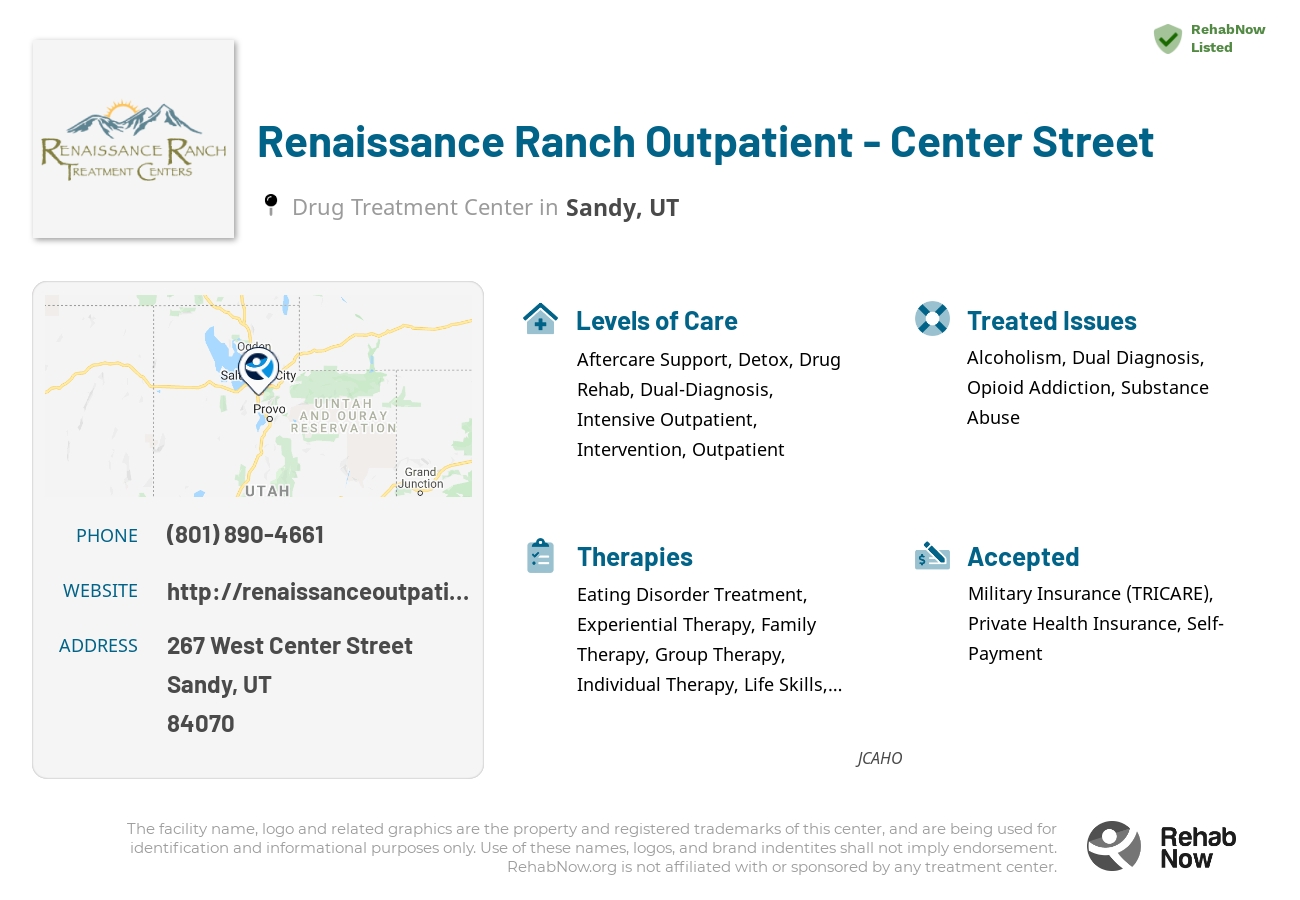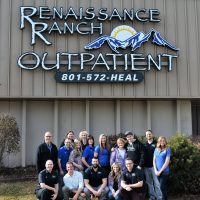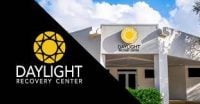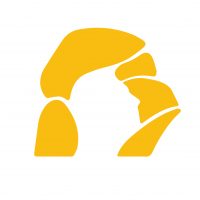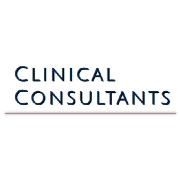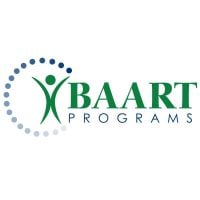Renaissance Ranch Outpatient - Center Street
Drug Rehab Center in Sandy, Utah
Renaissance Ranch Outpatient - Center Street is a faith-based treatment facility that offers evidence-based treatments and therapies, as well as practical lifestyle skills to help individuals and families struggling with addiction and substance abuse.
About Renaissance Ranch Outpatient - Center Street in Utah
Renaissance Ranch Outpatient - Center Street in Sandy, Utah is a faith-based treatment facility dedicated to helping individuals and families who are struggling with addiction and substance abuse. They provide a variety of evidence-based treatments and therapies, as well as practical, real-world lifestyle skills. The team at Renaissance Ranch Outpatient - Center Street is composed of experienced counselors and therapists who are committed to providing life-changing care and support to their clients and their families.
Renaissance Ranch Outpatient - Center Street provides assessments, individual, group and family counseling, cognitive and dialectical behavior therapy, education and prevention services, as well as nutrition and physical health services to help their clients heal. Clients are given the opportunity to develop more positive relationships with their families and build the skills necessary for a strong recovery. In addition, they have a variety of faith-based recovery programs available to assist their clients, such as spiritual counseling and life coaching.
Renaissance Ranch Outpatient - Center Street is accredited by The Joint Commission and licensed by the Utah Department of Human Services. They also offer an Alumni Program, where former clients can remain connected to their recovery and get continuous support. They also have a “Fathers in Recovery” program, which helps fathers who are struggling with addiction reconnect with their families and build strong relationships.
Genders
Ages
Modality
Additional
Accreditations

JCAHO
Conditions and Issues Treated
Many people need to recover from substance abuse to live a healthy life. In the end, if you can get through all the steps: detoxifying your body, rehabilitation after some time or when needed (depending on the type), and recovery while also receiving therapy support throughout the process, it can be worth it.
A detoxification center is a common place to start the recovery process from substance abuse. With your body and mind restored, you can continue to heal without the lingering effects of drugs.
Many people who struggle with opioid addiction need to attend specific programs like methadone , Suboxone or Vivitrol clinics.
These types of programs will provide the patient with legal, prescription medications that can help them overcome their cravings for illegal opioids like heroin or fentanyl . If the patient has a chronic condition like Hepatitis C, they must undergo treatment before they can begin taking these medications.
Dual Diagnosis is a specific relationship between two or more disorders that have the same symptoms and can sometimes be treated together. This is used in the treatment planning process when dealing with drug addicts. Dual diagnosis can be viewed as a chronic medical condition that has comorbid psychiatric disorders.
Although addiction and a mental illness may have separate symptoms that are not easy to detect, they often go hand in hand. Many times, drug abuse is a direct result of the mental illness. In other words, treating the addiction will not resolve all of your issues. Unless you also treat the underlying mental illness, you will not be successful in achieving sobriety.
Levels of Care Offered
This center offers a variety of custom treatment tailored to individual recovery. Currently available are Aftercare Support, Detox, Drug Rehab, Dual-Diagnosis, Intensive Outpatient, Intervention, Outpatient, with additional therapies available as listed below.
Detox refers to the progressive elimination from the body of toxins. The detox period depends on the form of addiction, the length of drug abuse, and the state of health. Under the supervision of medical practitioners, MAT detox based in Sandy, UT requires the use of medications.
An intensive outpatient program is usually the first phase of addiction treatment. It provides relief for those who are addicted, but are not ready to commit to an inpatient setting. Typically, the patient lives at home and is able to work or go to school. IOPs consist of a daily 3 to 5-hour program, and there is a required number of hours per week. Most patients go to IOP between 20 and 40 hours per week. The patient attends group counseling and individual therapy throughout the duration of treatment. They also meet daily with their therapist to discuss how it’s going and where they are in the recovery process.
The goal here is to teach patients healthy coping skills, such as stress management and identifying thoughts and behaviors that lead to relapse. The implementation of these skills will be useful as the individual transitions into the next phases of treatment.
An outpatient treatment program is set up to help with alcohol or drug addiction, or a co-occurring disorder. The patient must attend the Utah facility for their therapy and other programs but are able to return home each night. The frequency of mandatory attendance decreases after much of Renaissance Ranch Outpatient - Center Street‘s program is complete.
Intervention services can be beneficial for people who have not been able to overcome drug and alcohol addiction on their own. It is recommended for individuals whose addiction has led to dangerous or life-threatening circumstances.
Intervention services are beneficial for:
- People who have relapsed after completing other forms of addiction treatment.
- People with drug addictions that have led to dangerous health conditions, such as HIV.
- People who are at risk of losing their family, home, or job due to addiction.
- People who are having difficulty overcoming drug and alcohol addiction on their own.
- An intervention can be conducted by professionals, or by loved ones of an addict. If the person being intervened on agrees to enter addiction treatment after the intervention, the next step would be to choose a treatment program.
If they do not agree to enter addiction treatment after the intervention, loved ones may choose to go back to the drawing board and try another form of treatment. They may also choose to not receive any further treatment, but there are usually other factors in play that may make it difficult for people to stop using drugs or alcohol.
Aftercare is a term that’s used to refer to any sort of continuing care offered for a drug addict who has voluntarily entered a rehabilitation program. This type of care can be provided in several settings, including outpatient therapy sessions after the addict has completed an inpatient program. There are also 12-step support groups, such as Alcoholics Anonymous, which can provide additional help for addicts trying to stay sober.
Therapies & Programs
Individual Therapy is a critical component of addiction recovery. Therapists work with patients to identify the root of their addiction and figure out how to better handle the issues that led to them using drugs. Individual Therapy is the one-on-one session where people meet with their therapist. Individual therapy provides a safe space for people to open up and discuss personal and sensitive topics which they may not feel comfortable discussing in a group setting.
Family therapy will also help families realize that the addiction is not their fault. For many years, people blamed themselves for an addict’s behavior and felt that they had done something wrong. This is not the case. Addiction is a disease, and it can strike anyone, even if their life seems fine from the outside. It can bring a lot of shame to a family when they have an addict in their midst, but if everyone is open and honest with each other, then they can help everyone stay in recovery.
Group Therapy is utilized by drug treatment centers like Renaissance Ranch Outpatient - Center Street to provide the recovering drug addict with a platform to talk about their feelings and experiences. It also provides for an opportunity to learn from other addicts who have successfully overcome their addiction.
Group Therapy is employed in lectures, seminars, or discussion groups (the latter two are typically conducted as “therapy groups”). It is recommended that all group members be recovering addicts for this type of therapy to work (though it does not exclude others with lived experience).
Trauma therapy is a clinical process that helps individuals deal with mental stress often caused by traumatic events. It is generally done for children, teenage victims of sexual assault, and war veterans. The therapist helps the person identify, understand and work through the problem. This is done with the help of talking about it in group or one-on-one counseling sessions. Therapists use relaxation, role-playing, art, and music to help the person open up about what is bothering them.
Cognitive behavioral therapy is also a popular service for individuals living with addiction. This type of supportive treatment uses both one-on-one counseling and group sessions to teach addicts how to identify thoughts, behaviors and emotions that might increase their risk of relapse.
These professionals can help addicts develop coping skills for managing stress, improving self-esteem and overcoming triggers. They might also use behavioral therapy to help addicts learn how to avoid cravings and warning signs that could lead them back into addiction.
Therapy can be used as a step-down from inpatient treatment or as the primary method of overcoming an addiction. No matter which option is best for the addict, they will teach important emotional coping techniques, which can make it easier for addicts to get through the tough days.
Training in improved life skills helps those recovering from addiction feel more capable of self-care. Renaissance Ranch Outpatient - Center Street are daily skills that give the person the tools they need to survive.
The therapy covers practical activities like cooking, job hunting, social interaction, and money management, helping to fill in the knowledge gaps caused by addiction.
These life skills help the person self-manage their recovery and stay on track. It also reduces relapse risk as they gain confidence in their day-to-day abilities.
Patient Experience
Experiential Therapy at Renaissance Ranch Outpatient - Center Street
Experiential therapy is another form of treatment that helps addicts overcome their addiction. This type of service typically involves hands-on activities with the focus on physical experiences instead of emotions or beliefs.
Some examples include art therapy, equine therapy and music therapy. Each of these forms of experiential therapy can provide unique ways for addicts to channel their feelings and work through their demons. This type of therapy also allows addicts to develop meaningful emotional connections with others, which can prevent them from resorting to relapse as a coping mechanism.
Payment Options Accepted
For specific insurance or payment methods please contact us.
Is your insurance accepted?
Ask an expert, call (888) 674-0062
Renaissance Ranch Outpatient Associated Centers
Discover treatment facilities under the same provider.
- Renaissance Ranch Outpatient - 300 West in Sandy, UT
- Renaissance Ranch Outpatient - Farmington in Farmington, UT
- Renaissance Ranch Outpatient - St. Orem in Orem, UT
Learn More About Renaissance Ranch Outpatient Centers
Additional Details
Specifics, location, and helpful extra information.
Sandy, Utah 84070 Phone Number(801) 890-4661 Meta DetailsUpdated November 25, 2023
Staff Verified
Renaissance Ranch Outpatient - Center Street Patient Reviews
There are no reviews yet. Be the first one to write one.
Sandy, Utah Addiction Information
More than 500 people in Utah die each year from the effects of drug abuse and/or addiction. Substance abuse rates in Utah have seen an upward trend for a variety of drugs. Opioids are involved in almost 70% of all drug-related deaths in the state, annually. In 2014, Utah officials created a Good Samaritan Law to protect drug users who report possible overdoses from being prosecuted themselves.
The drug addiction problem in Sandy, Utah, is relatively bad. 9.5% of Sandy residents reported past-year drug use, while 6.8% reported past-year alcohol use. Additionally, around 4.7% of Sandy residents aged 12 or older reported using illicit drugs. There are many different types of drug treatment available in Sandy, Utah. Some of the most common treatments include inpatient and outpatient rehabilitation, 12-step programs, and detoxification.
Treatment in Nearby Cities
- Beaver, UT (165.2 mi.)
- West Jordan, UT (3.0 mi.)
- Eagle Mountain, UT (20.3 mi.)
- South Salt Lake, UT (8.7 mi.)
- Bountiful, UT (20.5 mi.)
Centers near Renaissance Ranch Outpatient - Center Street
The facility name, logo and brand are the property and registered trademarks of Renaissance Ranch Outpatient - Center Street, and are being used for identification and informational purposes only. Use of these names, logos and brands shall not imply endorsement. RehabNow.org is not affiliated with or sponsored by Renaissance Ranch Outpatient - Center Street.



